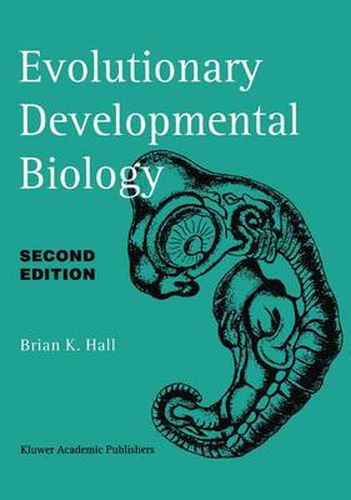Evolutionary Developmental Biology
Brian K. Hall

Evolutionary Developmental Biology
Brian K. Hall
This title is printed to order. This book may have been self-published. If so, we cannot guarantee the quality of the content. In the main most books will have gone through the editing process however some may not. We therefore suggest that you be aware of this before ordering this book. If in doubt check either the author or publisher’s details as we are unable to accept any returns unless they are faulty. Please contact us if you have any questions.
In his attempt to provide an overview of evolutionary development biology (EDB), Professor Hall adopts the opinion that EDB strives to forge a unification of genomic, developmental, organismal, population and natural selection approaches to evolutionary change. In so doing, he discusses approaches which range from the molecular/genetic to the population level, demonstrating how embryonic development relates to life-history evolution, adaption and interactions with the biotic and abiotic environment. There are eight parts to the book, the first of which attempts to place EDB in the historical context of the search for relationships between development and evolution by examining how the two terms and fields became related. A major thrust of this book is the theory that development and evolution are neither mutually exclusive, nor under independent control. Part of this section is therefore concerned with how development (proximation causation) impinges on evolution (ultimate causaton) to effect evolutionary change, and how development itself has evolved. Part Two chronicles the tension between approaches to animal relationships and between the individuals who have sought those relationships. This encopmasses the search for ordered embryonic and adult structure, and for equivalence of structures and features (homology) through types or archetypes. Part Three explores embryos in development, which includes the inevitability of using model organisms in development studies. The fourth part of this book considers embryos in evolution, and the fifth discusses the relationship between embryos, evolution and environment by documenting that inductive interactions are not limited to embryonic development, but can be extended to interactions among individuals and species. Part Six discusses the implications of larvae evolution, whilst Part Seven looks at the importance of how embryos measure time and place through heterochrony and heterotopy. The final part of the text presents a theorem of EDB’s underlying principles and processes.
This item is not currently in-stock. It can be ordered online and is expected to ship in 7-14 days
Our stock data is updated periodically, and availability may change throughout the day for in-demand items. Please call the relevant shop for the most current stock information. Prices are subject to change without notice.
Sign in or become a Readings Member to add this title to a wishlist.


